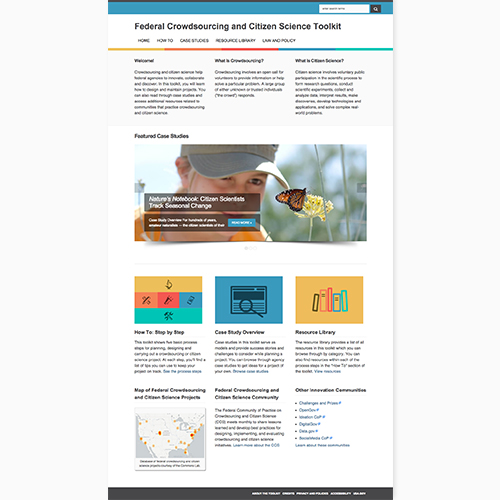Today, USDA will engage with citizen-science professionals, researchers, and stakeholders from local, state, Federal, and Tribal governments, as well as representatives of the academic, non-profits, and private sector to celebrate citizen science at the first-ever White House citizen science forum on “Open Science and Innovation: Of the People, By the People, For the People” – co-hosted by the White House Office of Science and Technology Policy and Domestic Policy Council. The forum will raise awareness of citizen science and crowdsourcing as innovative approaches that can be used to solve complex real-world problems and encourage more Americans to take advantage of them. For example, Dr. Ann Bartuska, Deputy Under Secretary of USDA’s Research, Education and Economics mission area, is moderating a panel discussion on citizen science in areas related to water and agriculture.
A key highlight of the forum will include the launch of the first-ever Federal Crowdsourcing and Citizen Science Toolkit. USDA has played a critical role in development of the Toolkit as part of the management team in a multi-agency workgroup that brought over 25 federal agencies and 125 federal employees together over the past nine months. The Toolkit provides information and resources that can help federal agencies harness the power of public participation, and advance the culture of innovation, learning, sharing, and doing in the federal community, to help solve scientific and societal problems.

As lead for the Toolkit’s design and development team, we had the opportunity to work with an amazing and talented group of federal employees to help bring together this vision from President Obama’s call-to-action in the 2013 Second Open Government National Action Plan. The broad agency collaboration that went into the creation of this Toolkit can serve as a model for how federal agencies can do great things when we work together toward a common goal.
We believe this effort demonstrates best practices through development of a federal employee-focused solution using a model-in-method approach, where the intended methods or repeatable processes of citizen collaboration and transparency were deliberately used by the development team to build the Toolkit. We can become accustomed to accepting very small, incremental improvements in public service. The Toolkit blows this learned behavior to pieces with a single concept: governing works better when everyone has an equal share in making it happen.
Citizen science and crowdsourcing helps Federal agencies advance and accelerate scientific research through group discovery and co-creation of knowledge. Increased science literacy and providing citizens with skills needed to excel is the basis of enhanced science, technology, engineering, and math (STEM) programs. Volunteers in projects gain hands-on experience doing real science, and students can take that learning outside of the traditional classroom setting. These approaches also connect citizens to the missions of Federal agencies by promoting a spirit of open government, volunteerism, and stewardship.
USDA’s Open Data STEM Summer Camp introduces new steps to increase the ability of students to participate in the scientific process of crowdsourcing through citizen science projects. Our collective achievements will be recognized in briefings by two of these students at the White House today.
You can watch the livestream of the forum from 8 AM-12 PM EDT at wh.gov/live. Send your thoughts, comments, and questions to @WhiteHouseOSTP using the hashtag #WHCitSci.
